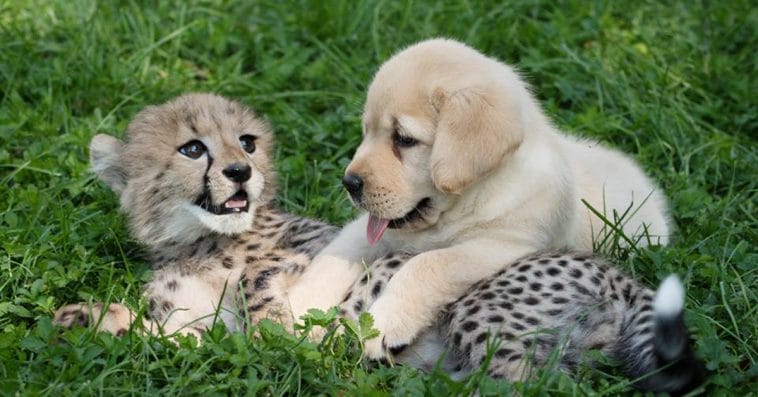Cheetahs may appear intimidating as they stalk their prey over Africa’s grasslands, but they are actually shy, sensitive, and introverted creatures. They are prone to being nervous, which causes them anxiety. But do you know how zoos handle cheetah anxiety in captivity?
Cheetahs are quiet, sensitive, and introverted members of the big cat family and are prone to anxiety. To help cheetah cubs overcome this, zoos provide them with their own emotional support dogs.
Puppies to the Rescue
While we assume that cheetahs are intimidating, this is actually the opposite. They are quite reserved and introverted, and they tend to develop anxiety.
If a cheetah becomes too stressed to procreate, it would become extinct, something that top cheetah researchers are concerned about because the creatures are already extinct.
Zookeepers at the Columbus Zoo are teaming each cheetah with its emotional support dog to avert extinction. The idea is for the dog’s easygoing, happy-go-lucky nature to rub off on the worried cats. They also want the cheetahs to learn how to relax playfully.
This isn’t the first time since cheetahs have been used as emotional support animals at the San Diego Zoo Safari Park since the 1980s. Previously, though, it was only done in exceptional cases. On the other hand, dogs are now being utilized more regularly to aid cheetah conservation efforts.
According to the San Diego Zoo, cheetah cubs are assigned a companion when they are three to four months old. The cheetahs and their canine friend are first acquainted from opposing sides of a fence. The dogs are leashed and with a handler during this period.
If the zookeepers notice a prospective match, they will arrange for the two animals to have a playdate to get to know one other. This is always a slow procedure, especially for cheetahs who may be nervous.
If the encounter goes well, the handlers will continue to observe them before deciding when the dog can be released from the leash. They can be moved into an area where they will spend much time together if this decision is made. (Source: Cesar’s Way)
The cheetahs and their emotional support dogs will only be separated during mealtimes at this stage, and they will do most of their other activities together.
Cheetahs have significantly benefited from the use of emotional support animals. Cheetah cubs have exhibited evidence of imitating their canine companion’s confident and lively personality in numerous circumstances. This gives hope that these relaxed cheetahs will be able to breed more in the future as they age. (Source: Pet Helpful)
The Problem with Cheetahs in Captivity
Cheetahs live an average of eight years in the wild, while 17 years in captivity is not uncommon. However, despite the increasing success, this problem is because cheetahs do not reproduce well in captivity. As a result, they are relatively uncommon. Cheetahs are occasionally poached in the wild to produce babies for the pet trade.
Only about 44% of zoological facilities that attempted to breed the animals were successful, with only 20% of captive-bred cheetahs reproducing and 15% of wild-caught cheetahs reproducing. Low sperm count and other abnormalities cause 37 percent of infant mortality, which is caused by various reasons, including poor husbandry standards. (Source: Pet Helpful)
